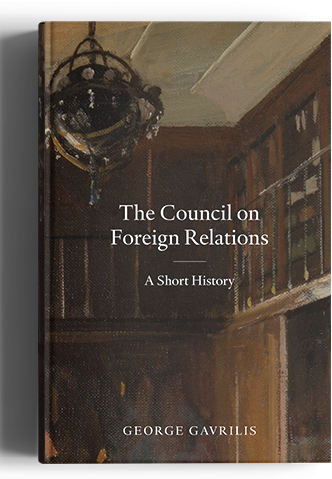The Council on Foreign Relations at 100: The History

The Council on Foreign Relations: A Short History
Peer into a history of members, leaders, programs, and impact from CFR’s 1921 founding to its entrance into a new century.Read twenty-six of the magazine’s greatest hits, from George F. Kennan and Henry A. Kissinger to Samuel P. Huntington and Francis Fukuyama. Articles published prior to 1975 may be accessed with a subscription to Foreign Affairs.
With great power comes great responsibility. For the United States to play a constructive role in the world, American citizens need to learn about foreign policy.
Read MoreNationalism involves a deep attachment to a particular community in a particular place. True internationalism involves not abandoning those communities but connecting them.
Read MoreEvery great European empire today walks with its dark colonial shadow. The problem of the twentieth century is the problem of the color line.
Read MoreThree months after coming to power, the Nazis have wiped out the past—the Kaiser’s Germany as well as the Weimar Republic. Adolf Hitler’s dictatorship is uncontradicted and built to last.
Read MoreThe social psychology of populist authoritarianism, told through the story of Nazi Germany. As relevant today as when it was written.
Read MoreSoviet expansion is driven by internal forces and will not stop. The United States should respond with a policy of long-term, patient, and vigilant containment until the regime changes.
Read MoreStable nuclear deterrence is not automatic—and given the increasing size and sophistication of the Soviet arsenal, Washington needs to do much more to maintain it.
Read MoreLinking national identity with industrial development is a recipe for the mass loss of human dignity. Globally, the skills and resources exist to meet human needs. What gets in the way is politics.
Read MoreAmerican military interventions are driven by ideology rather than rational calculations of national interest or probabilities of success. A wiser country would attempt less and achieve more.
Read MoreCommunist China cannot be left outside the family of nations forever. It should be pulled back into the world community—but as a great power, not the epicenter of world revolution.
Read MoreTerrorism is a strategy of the weak, using political violence to scare people into doing what the terrorists want. It cannot always be prevented, but it can always be defeated—by refusing to give in.
Read MoreEver-expanding consumption of fossil fuels causes economic, geopolitical, and environmental problems. The only way to solve them is by shifting to efficient, renewable, and sustainable energy sources.
Read MoreThe myth of one Arab nation with an immortal mission is fading in the harsh light of postcolonial reality. Slowly and grimly, a normal state system is becoming a Middle Eastern fact of life.
Read MoreThe Soviet Union is in the throes of a serious systemic crisis. If Washington can check any attempt at external aggression, Moscow will have no choice but to turn inward toward peaceful reform.
Read MoreThe West’s total victory in the Cold War was an epic achievement. Post-Soviet Russia can and should play the role of a great power—but only if it sheds its imperial aspirations.
Read MoreDespite what many think, the world’s leading nations are not in economic competition with each other—and economic policies driven by obsession with competitiveness are costly and dangerous.
Read MoreContainment was an extraordinary theory. Thoroughly American in its utopianism, after more than four decades of struggle, it ultimately achieved almost everything it sought.
Read MoreThe Cold War and the Soviet Union were never central parts of the story of the postwar liberal international order. When they passed into history, the order was free to expand—and it did.
Read MoreWestern culture is not universal, nor will it become so. There are several civilizations on the planet; the West should strengthen its own, respect the others, and leave them alone.
Read MorePower is diffusing from states to an increasing array of nongovernmental, transnational, and supranational institutions. Contemporary problems are nonterritorial, so the trends will continue.
Read MoreDemocracy without constitutional liberalism is not just inadequate, but dangerous. It brings erosion of liberty, abuse of power, ethnic divisions, even war. Unfortunately, it is the story of our age.
Read MoreThe 9/11 terrorist attacks were designed to trigger a military overreaction by the United States, one that would create domestic problems for Osama bin Laden’s real enemies—existing Arab regimes.
Read MoreA pandemic is coming—tonight, next year, or in ten years. We need to plan, urgently. If we start transforming vaccine production now, in ten years we would have a much less devastating outcome.
Read MoreGlobalized capitalism is eroding the social base on which liberal democracy rests. The left must offer an alternative that boosts the middle class, attacks inequality, and reforms the public sector.
Read MoreThe most enduring legacy of slavery remains the maintenance of white supremacy throughout American life—a context necessary to understanding contemporary national problems.
Read MoreUs-versus-them thinking runs deep in human brains. Science paints a grim picture of our nature as social beings, with depressing political implications.
Read More